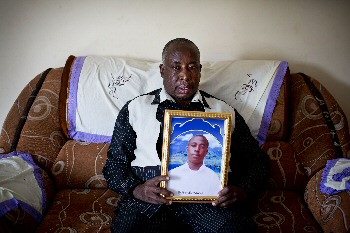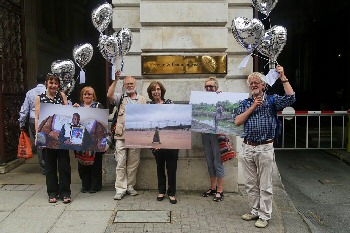|
New survey highlights what 'justice'
means to Brits

75% of British people would expect to
be given financial compensation if the actions of a UK company led to them or
their families being harmed in some way, a new survey shows.
The UK's leading fair trade organisation, Traidcraft, surveyed a sample of the
UK public to find out what we regard as 'adequate justice', before taking
to Westminster, where campaigners called on the new government to put justice
for those in the developing world who've been harmed by UK companies at the
heart of their plans on business and human rights.
As UK companies become increasingly global, it is inevitable that big
corporations will have an impact on workers and communities in the developing
world. Whilst some companies work hard to minimise their impact, there is a
minority that continue to make decisions which result in harm, mistreatment,
abuse or even death to those living in developing countries such as Tanzania,
Bangladesh and Nigeria.
As the government looks to review the UK National Action Plan on Business and
Human Rights this summer, Traidcraft visited Westminster calling on ministers to
ensure that justice for victims is at the heart of this revised plan.
Mary Milne, Traidcraft Campaigns Manager, said:- "The contents of this
action plan could be pivotal for people in developing countries who are still
being mistreated by the actions of UK companies. Although some companies are
working hard to make sure they benefit local people, others are getting away
with things in developing countries which would not be tolerated here. If it's
good enough for us, it should be good enough for others, regardless of where
they happen to live.
Companies get away with these abuses because there is no robust system in place
to hold them to account. This means people who have been harmed often don't even
get so much as an admission of guilt; not to mention financial compensation,
which our survey shows is the very basic form of justice we would expect here in
Britain. And of course if companies get away with their actions, there's then no
incentive for them to improve."

Traidcraft has highlighted the case of 56 year old Magige from Tanzania. He lost
his eldest son Emmanuel, when he was shot and killed at a gold mine near their
village. The mine is owned by a UK based company. The loss of his son hit Magige
hard. "My family depended on him so much. He was going to look after me
when I got old and now he is gone."
With support from a local organisation and a London-based law firm, Magige was
able to bring a case against the company through the English civil courts.
Earlier this year, the company agreed to pay an undisclosed sum in an
out of court settlement, while continuing to deny responsibility for Emmanuel's
death.
Without the case, it seems very unlikely that Magige would have been able to get
justice. But there are many victims of UK companies in developing countries who
have not even been able to do this. And recent changes mean it's getting even
harder for individuals to bring cases.
You can make a difference and help us stand up for justice. Visit:-
TraidCraft.Co.UK/JusticeCampaign to find out more.
|
